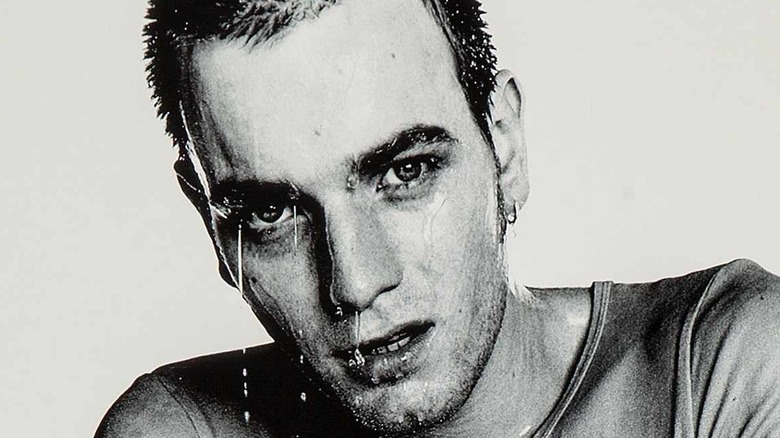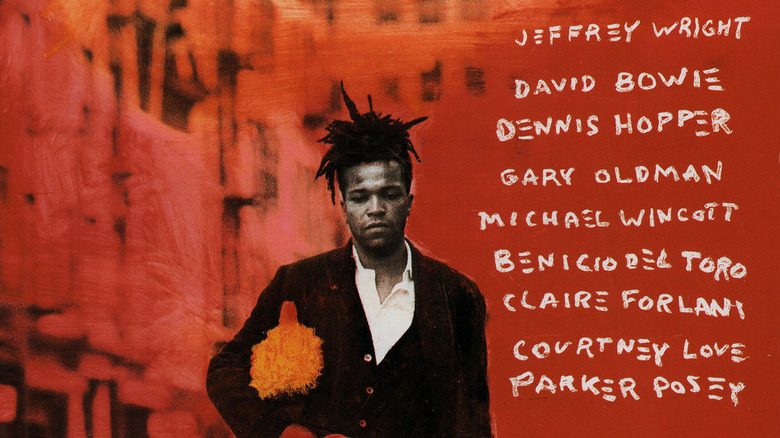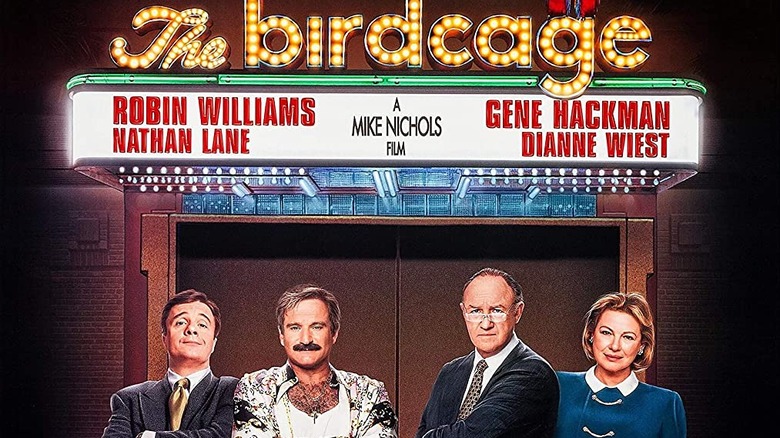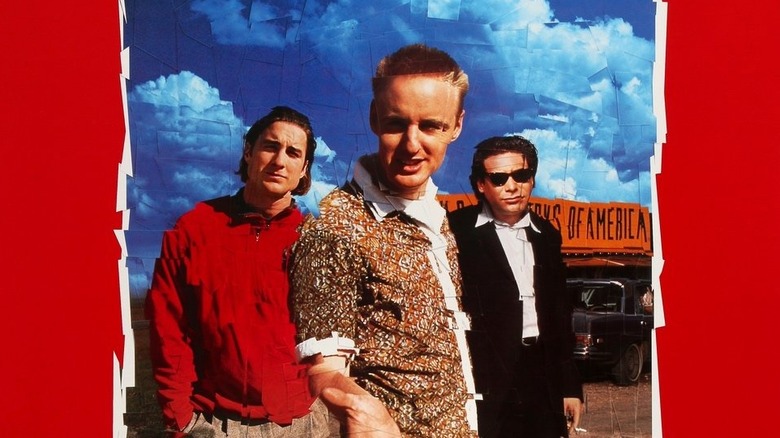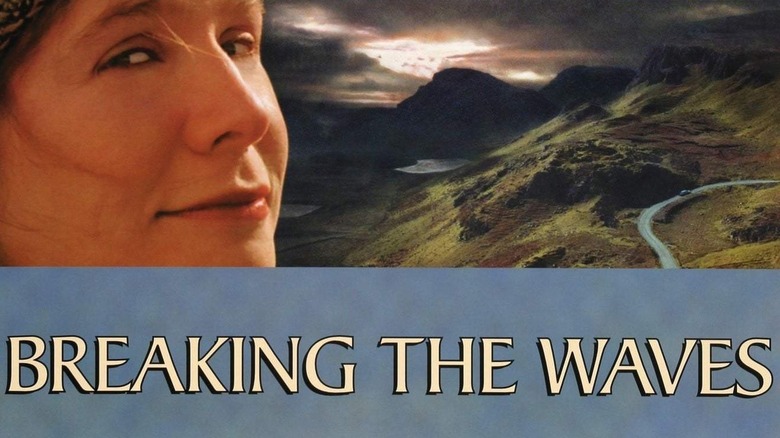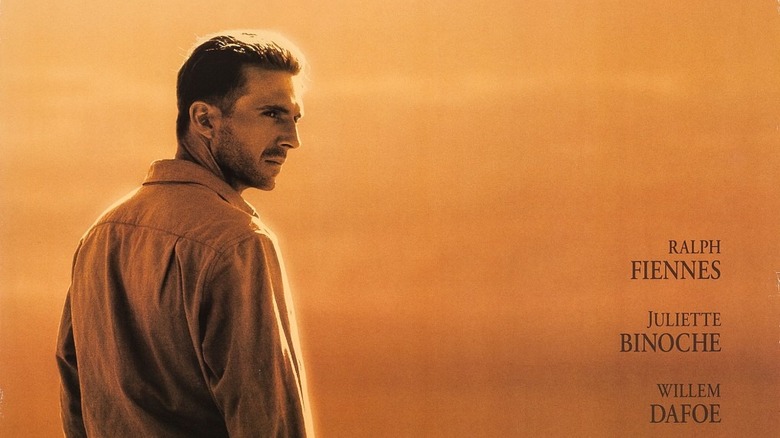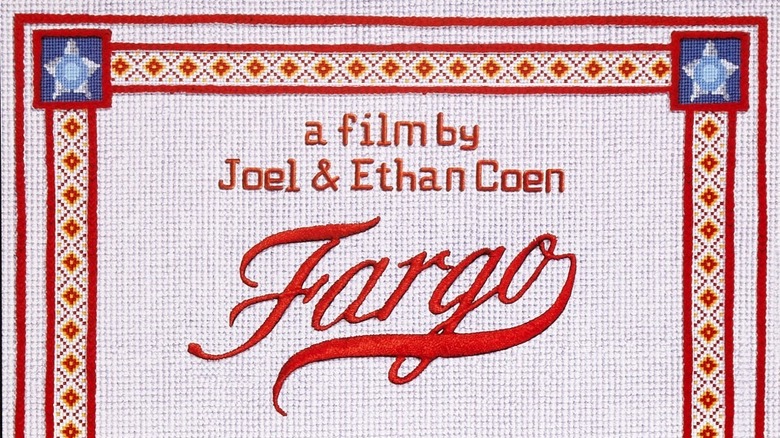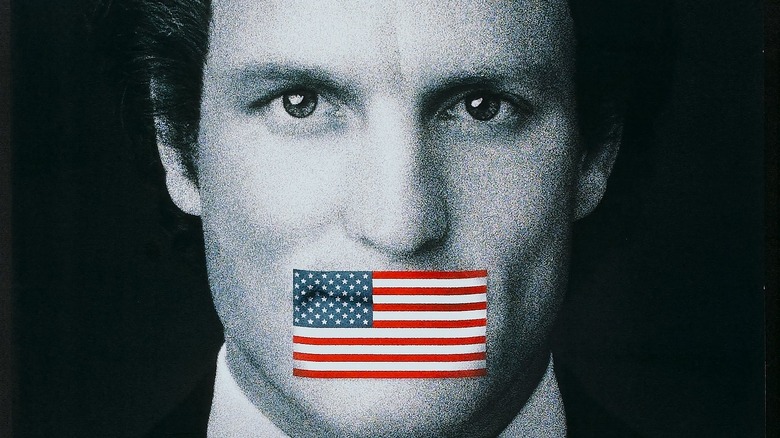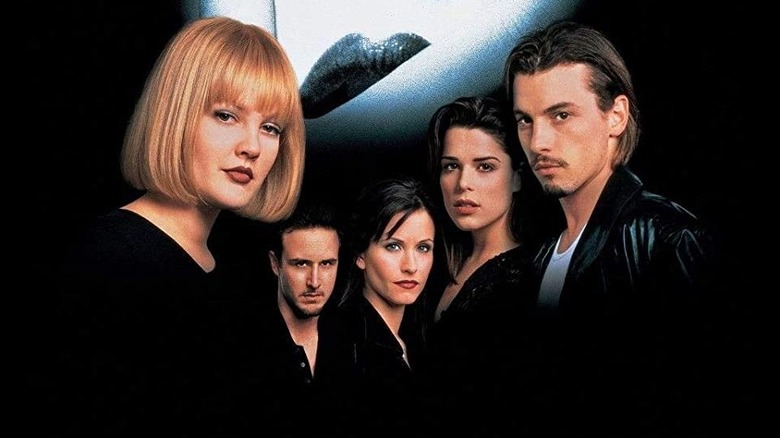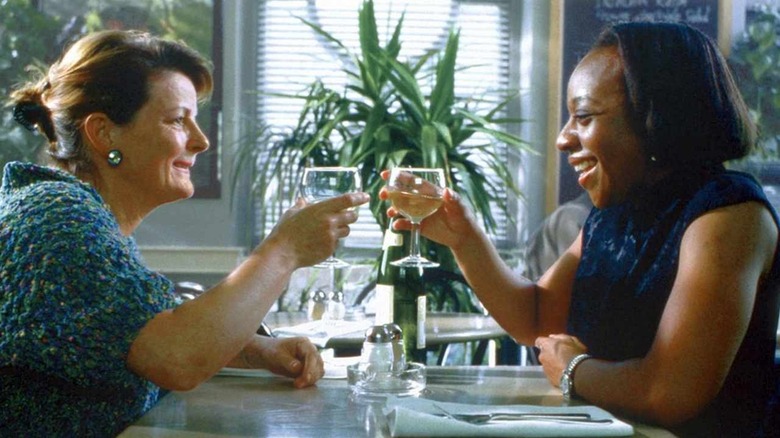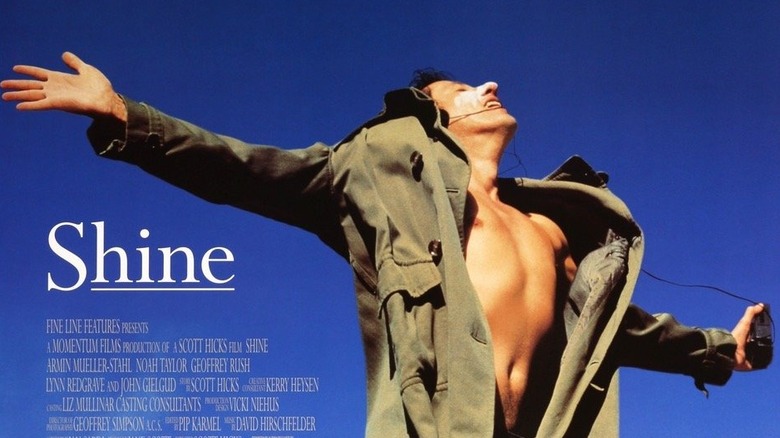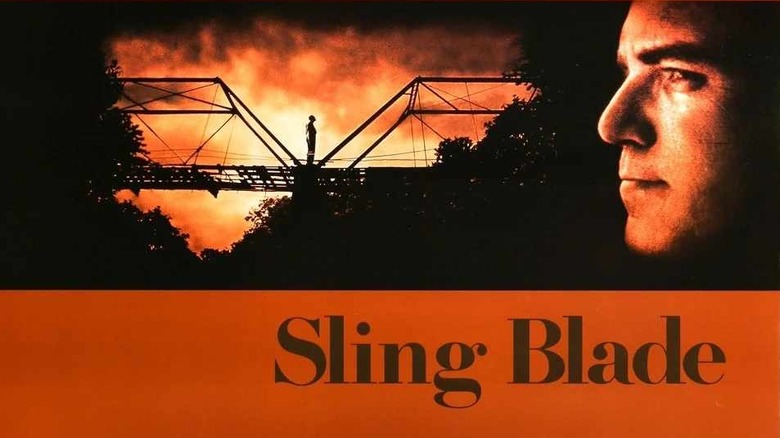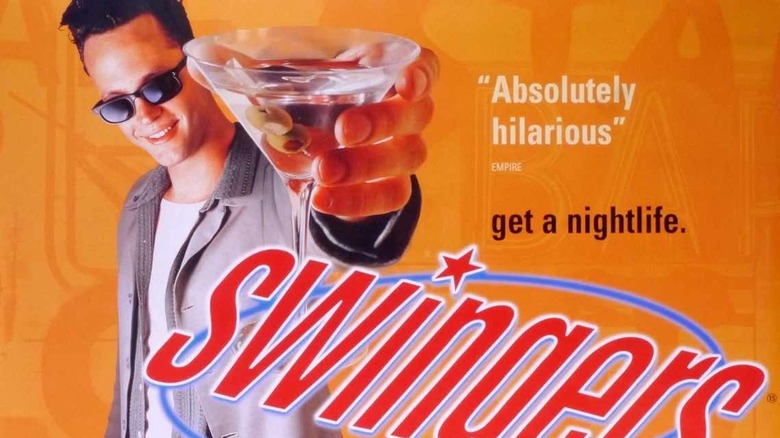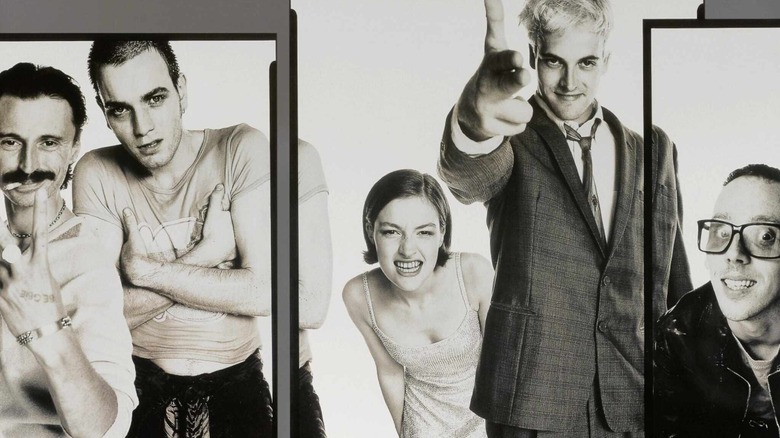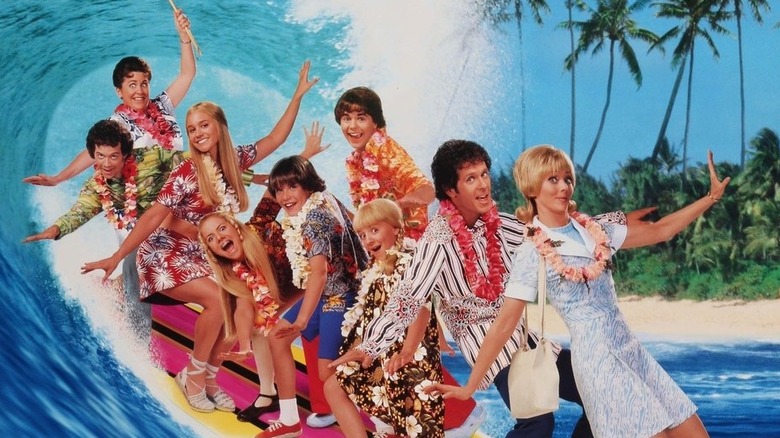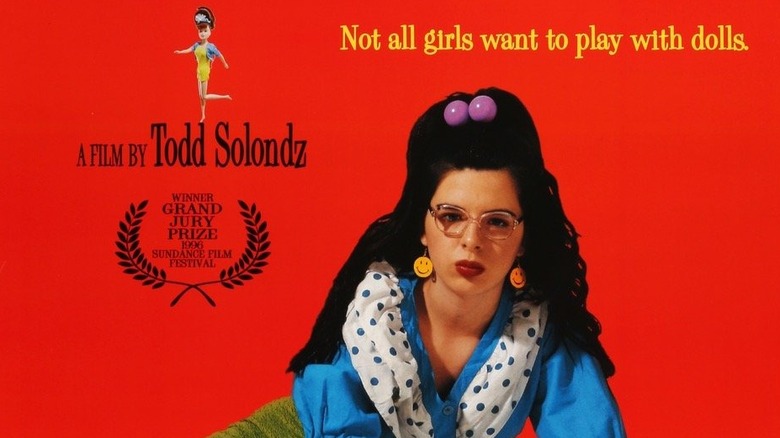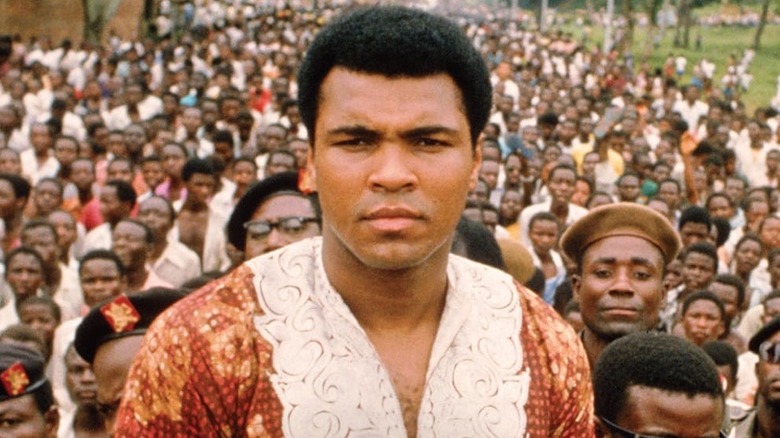The Best Movies Turning 25 In 2021
1996 was a year in which many independent filmmakers found themselves under the wing of Miramax Films, who shepherded many of Sundance darlings into hits. Some were imported while others were homegrown, and they may have taken a little bit of time to find their audience, but when they did, they left a lasting impression.
Unknown actors came out of the woodwork to headline movies, and some were even rewarded with a trip to the Academy Awards. 1996 introduced us to Wes Anderson, Owen Wilson, Geoffrey Rush, Emily Watson, Jon Favreau, and Vince Vaughn, as well as bringing the horror genre back from the dead and putting Scottish filmmaking on the cinematic map. Two and a half decades later, the dust has settled and we can clearly see which movies from 1996 have stood the test of time. Here are the very best films that are turning 25 in 2021.
Basquiat
In 1996, the New York expressionist painter Jean-Michel Basquiat wasn't as well-known as he is today, but the biopic "Basquiat" by painter-turned-director Julian Schnabel has kept him relevant. Schnabel reflected to the Hollywood Reporter, "I don't know about a lot of other things, but I guess I do know about being an artist, since that's what I spend my time doing. They're not biographies. It's more of a portrait."
Schnabel wanted an unknown actor for his "Basquiat," with Chris Rock given consideration, but the role went to Jeffrey Wright. Wright saw a connection with the artist, as he told expressionist artist Traver Dodorye in an interview, "his work fits into similar cultural and historical and creative reservoirs that I use often in my work."
"Basquiat" captures the painter's rise in the New York art scene, his struggle with drugs, and his ultimate downfall. Its robust cast was rounded out by Gary Oldman, Dennis Hopper, Parker Posey, Benicio del Toro (who won an Independent Spirit Award for his performance), and David Bowie as Andy Warhol. Bowie wore one of Warhol's actual wigs and leather jackets, on loan from his Pittsburgh museum.
The Birdcage
According to a Mike Nichols interview with Entertainment Weekly, he and Elaine May: "were after 'The Birdcage' for 20 years after we saw 'La Cage Aux Folles' because it was about family, it wasn't about being gay at all."
Steve Martin and Robin Williams were set to star as Armand and Albert Goldman, a flamboyant couple with a thriving Miami drag club, who have to put on a straight-laced act for their son who's about to marry into a conservative Senator's family (a game Gene Hackman and Dianne Wiest). Martin had to drop out, Nathan Lane stepped in, and then swapped roles with Williams. The two made for quite the comedic riot, as Williams told Premiere Magazine that when he first met Lane, "it was laugh at first sight!" "The Birdcage" was not only a laughing matter, with Williams adding, "It's a love story."
"The Birdcage" won a Screen Actors Guild Award for its ensemble cast, and a special place in director Paul Thomas Anderson's heart, as one of his go-to comfort movies.
Bottle Rocket
Wes Anderson and Owen Wilson were University of Texas students, who turned a dispute with a landlord into a failed, staged apartment break-in, and then into a plot device for a 1992 13-minute short called "Bottle Rocket," co-starring Robert Musgrave and Owen's brother Luke. The short caught producer James L. Brooks' attention, allowing them to extend it into a feature-length film, which found Dignan (Owen Wilson) roping his friend Anthony (Luke Wilson) into pulling off pathetic heists to impress Mr. Henry (James Caan).
Anderson reflected in an interview with LA Weekly: "Our whole lives were dedicated to this, it was a thing that meant something to us. It was based on our own ideas, and we thought they were different from other people's ideas, and it was just what we were stuck on." Test screenings were a "disaster," and the box office returns were underwhelming.
Eventually "Bottle Rocket" found its audience, who rooted for the offbeat but sweet bandits. The legend of Wes Anderson was born: His debut film made enough of an impact for Martin Scorsese to include it on his list of the best films of the 1990s.
Breaking The Waves
In his review for "Breaking The Waves," Roger Ebert wrote, "not many movies like this get made, because not many filmmakers are so bold, angry and defiant." This could actually describe any Lars von Trier film, but is especially relevant to "Breaking the Waves."
The challenging story is set in the Scottish Highlands of the 1970s, where we find a husband (Stellan Skarsgård) who becomes paralyzed in an accident and encourages his beloved wife (Emily Watson) to take other lovers. To Criterion, von Trier said of "Breaking the Waves": "I prefer working with extreme ideas, and I wanted to make a film about 'goodness'," adding, "I also wanted to make a film with a religious theme, a film about miracles. And at the same time, I wanted to make a completely naturalistic film."
"Breaking the Waves" won the Grand Prix at the Cannes Film Festival and, with Watson's feature debut, an Academy Award nomination for best actress. Looking back in an interview with Criterion, Watson said, "I didn't go into this project with my eyes open, in any way whatsoever. I'd hardly been in front of a camera ever before, so it was really falling off a cliff, falling off a cliff backwards."
The English Patient
"The English Patient" centers around a mysterious, badly burned man, who is slowly dying in an Italian monastery at the tail end of World War II. He is tended to by a nurse (Juliette Binoche) whom he regales with his story: an exploration of the Saharan desert and a love affair among the sand.
When Anthony Minghella read Michael Ondaatje's source 1992 novel he was enraptured by its "deceptive appearance of being completely cinematic." He told Criterion, "Brilliant images are scattered across its pages in a mosaic of fractured narratives, as if somebody had already seen a film and was in a hurry trying to remember all the best bits." Minghella's screenplay in turn enraptured Ralph Fiennes, who was moved to tears by it, telling the Hollywood Reporter, "I think Anthony just tapped some extraordinary emotion, in a story of the past, and a story of the war and a story of loss and regret."
Then the world became enraptured with the finished film, which became the most celebrated at the 1997 Academy Awards. "The English Patient" was nominated 12 times and walked away with nine statues including the awards for best picture, best director for Minghella, and best supporting actress for Binoche.
Fargo
Set in frigid Minnesota in 1987, "Fargo" takes us on a tragic comedy of errors when a car salesman (William H. Macy) hires two nitwit thugs (Steve Buscemi, Peter Stormare) to kidnap his wife in a fraud ransom scheme. It, predictably, goes terribly wrong, leaving pregnant police chief Marge Gunderson (Frances McDormand) to put the pieces together.
McDormand complimented her husband Joel Coen and brother-in-law Ethan for writing this "great female character" that won all three of them Oscars. On Marge and her "Minnesota nice," she said to the New York Times, "As normal as she seems, there's something about her that people want to know more about because they don't fully understand her."
McDormand used her prison Chaplin sister Dorothy as inspiration for Marge, and dialect coach Liz Himelstein helped to shape those unforgettable patterns of speech. But whatever you do, please don't approach McDormand with your version of the accent.
The People vs. Larry Flynt
Hustler pornography magnate Larry Flynt lived a very colorful life. So it's only fitting that his story, which includes being paralyzed from an assassination attempt and becoming an unlikely first amendment advocate, would receive a big-screen treatment directed by Miloš Forman. Tom Hanks and Bill Murray were considered for the lead role, and Flynt himself was keen on Michael Douglas, but Woody Harrelson would eventually star in Forman's "The People vs. Larry Flynt."
Both Harrelson and Forman garnered Academy Award nominations for their work, and made it a point to say one didn't have to agree with what Flynt did for a living to appreciate the film's larger message. As lawyer Alan Isaacman, played by Edward Norton, says in the film, "I don't like what Larry Flynt does, but what I do like is the fact that I live in a country where you and I can make that decision for ourselves. I like the fact that I live in a country where I can pick up Hustler magazine and read it, or throw it in the garbage can if that's where I think it belongs."
Scream
In an interview with Collider on the 20th anniversary of "Scream," writer Kevin Williamson mentioned seeing a void in the genre, saying that "horror films had died a little bit before 'Scream' came around. That was one of the reasons I wrote it." His script, inspired by The Gainesville Ripper, finds the teens of Woodsboro, California taunted and terrorized by a killer in a Ghostface mask, in a savvy slasher cleverly directed by Wes Craven.
Together, Williamson and Craven set out to resurrect an entire genre, and their strategy was simple. As Craven said to Film School Rejects, "you talk about the rules of films, and then break those rules and do something that hasn't been done before." Like killing off your supposed star Drew Barrymore's character in the opening scene, for instance.
The excellent young cast, including Neve Campbell, Courteney Cox, David Arquette, Rose McGowan, Skeet Ulrich, and Matthew Lillard, were game for anything. Lillard spoke of everyone's commitment to Den of Geek, "there was this reckless abandonment, putting all your faith in this director," adding, "it's one of the greatest experiences of any of our careers."
Sequels followed, as well as parody films (and even copycat crimes), and as Williamson said about the genre he raised from the dead, "I feel like it's never stopped. There's never been another lull."
Secrets & Lies
Writer/director Mike Leigh was eager to explore a fictitious story about adoption, saying to IndieWire that he "also wanted to make a film about the new generation of young Black people who are moving on and getting away from the ghetto stereotypes. And these were jumping off points for a film which turns out to be an exploration of roots and identity."
"Secrets & Lies" follows a successful Black optometrist (Marianne Jean-Baptiste) who seeks out her birth mother (Brenda Blethyn), a working-class woman with her own family strife. Her journey opens up old wounds, but also creates new bonds. Speaking of Leigh's filmmaking process, which started with no script and months of improvisation, Blethyn said to Bomb Magazine, "We're simply acting and reacting as that character would do in any given situation. And that's the way Mike Leigh works."
"Secrets & Lies" won the Palme d'Or at the Cannes Film Festival, with Blethyn awarded as best actress. It received five Academy Award nominations, including best picture, director, screenplay and nods for both actresses, making Jean-Baptiste the first Black actor from Britain to do so.
Shine
In 1986, director Scott Hicks caught a comeback performance from Australian piano prodigy David Helfgott, and said to Entertainment Weekly that he "was so astonished by what I saw that I approached him and his wife and said, 'Look, can we talk about the idea of a film?"' Ten years later, Hicks tapped virtually unknown Geoffrey Rush to play Helfgott in his life's story, which features the pressures of an overbearing father, fame, and mental illness.
Scott's faith in Rush paid off as "Shine" was nominated for seven Academy Awards, including best picture, and Rush's astonishing performance earned him the Oscar for best actor. Rush praised Scott for his research and interviews with Helfgott, saying to Glam Adelaide, "I had access to all of them. Because David has such idiosyncratic speech patterns, it's almost like learning some obscure language, like Esperanto. So I was able to osmose much of that."
Sling Blade
"Sling Blade" began life as a 1986 one-man stage show called "Swine Before Pearls" by actor Billy Bob Thornton, which then became a 1994 George Hickenlooper-directed short film titled "Some Folks Call It a Sling Blade." When the Sundance hit was turned into a feature, Thornton chose to helm the film himself, even though he said to Bomb Magazine that he had "no burning desire to be a director, I'm just directing out of necessity, really."
Thornton plays Karl Childers, an intellectually disabled man who murders his mother and her lover as a child. The feature expands on the original story by having Childers return to society and take a shine to a boy (Lucas Black) who encounters trouble with his own mother's lover (Dwight Yoakam). "Sling Blade" would go on to earn Thornton a Best Actor nomination and a win for his screenplay at the Academy Awards.
Swingers
When Jon Favreau was writing "Swingers," he told Grantland, he was "drawing from the environment I was living in. I had characters loosely based on people I knew. None of the events were real." The film simultaneously launched the careers of Favreau and Vince Vaughn (who had met on the set of 1993's "Rudy"), created a resurgence of swing music, made Vegas a hot tourist destination, and introduced new slang, some of which is still in use today.
The Doug Liman film about a broken-hearted New Yorker (Favreau) who is transplanted to Los Angeles and shown the ropes by his cocksure friend (Vaughn) was a labor of love. Rejected as a submission at Sundance, Liman rented out a theater in Los Angeles to drum up interest, which resulted in a bidding war with Miramax Films paying $5 million to secure distribution rights. The box office take didn't even match that number, but word of mouth made it a veritable hit when it reached the home video market.
Trainspotting
One of the most remarkable film achievements of 1996 came from Scotland, exposing the tremendous talents of its countrymen to a global audience. Irvine Welsh's 1993 novel of the harrowing pains of heroin addiction and one man's halfhearted efforts to find his way out of the Edinburgh drug scene, "Trainspotting," was masterfully adapted by director Danny Boyle. The director told The Guardian that he had initially set out to make "a pleasurable film out of unwatchable subject matter." Together with writer John Hodge and producer Andrew Macdonald, he shined a bright light on actors Ewan McGregor, Jonny Lee Miller, Robert Carlyle, Ewen Bremner, Kevin McKidd, Shirley Henderson, and Kelly Macdonald.
"Trainspotting" packs a lot into its 93 minutes, and Boyle said in an interview with the Director's Guild of America that the style was "trying to capture some of the brio of the book. I mean by that it could take any turn. It didn't have to be measured: You could go from obscene to surreal to comic without a problem." The high energy was synced up with a pulsating soundtrack ("Lust for Life!") that warranted two separate album releases. Even the posters and trailer were brilliantly produced and became memorable in their own right.
A Very Brady Sequel
Creating a comedy based on a beloved TV series has proven to be one of the more difficult tasks in Hollywood, but one year after the success of 1995's "The Brady Bunch Movie,” the groovy family was at it again in "A Very Brady Sequel," from first-time director Arlene Sanford. The trouble begins when Roy Martin (Tim Matheson) shows up at the Brady household claiming to be Carol's first husband, and chaos unfolds. In this bigger and more bananas sequel, Greg and Marcia break taboos about romance within stepfamilies, making out in their makeshift attic bedroom. The gang sing and dance their way to Hawaii. Alice accidentally serves spaghetti laced with magic mushrooms, which prompts Matheson's con-man character to exalt, "Oh my God, I'm tripping with the Bradys."
While the original "Brady Bunch" actors took a pass on cameos for the sequel, that didn't stop it from becoming a veritable star-studded event, with RuPaul, Zsa Zsa Gabor, Rosie O'Donnell, Barbara Eden, and John Hillerman (of "Magnum P.I." fame) all joining in on the fun. The sequel is still making waves today, as Elizabeth Olsen mentioned in an interview with Rolling Stone that she used it as her reference to the 1970s when preparing for "WandaVision," while the withering "Sure, Jan" retort from Marcia has become a meme in its own right.
Welcome to the Dollhouse
Todd Solondz's "Welcome to the Dollhouse" won the Grand Jury Prize at the 1996 Sundance Film Festival, as passionate fans saw something of themselves in its heroine Dawn Wiener, played with a tender heart by Heather Matarazzo. She is the ultimate middle child, trying to weave her way through seventh grade, while being bullied at school and neglected at home. Solondz made it clear in an interview with Film Scouts that "nothing in the movie actually happened to me but in a way it's as if it had."
Matarazzo told The Guardian that she "was very persistent and very adamant that this script was incredibly honest and spoke to me: the concept of a young woman who isn't necessarily popular, doesn't have any friends, and yet survives." Solondz built "Welcome to the Dollhouse" to tackle a tender age that was "not treated seriously" in American cinema, saying "You have either the cute and cuddly Disney kid or the evil devil monster. For me it's fertile territory — middle-class kids growing up in the suburbs."
When We Were Kings
In "When We Were Kings," a documentary that was 22 years in the making, two larger-than-life athletic figures step into the ring. Leon Gast was tapped by boxing promoter Don King to capture the sights, sounds, and hoopla surrounding the "Rumble In The Jungle" match between George Foreman and Muhammad Ali, as well as the accompanying music festival, Zaire 74, with the likes of James Brown, B.B. King, and Bill Withers performing.
An injury caused the boxing portion of the events to be delayed, so Gast got to spend a lot of time with Ali, who provided plenty of memorable material. Financing delayed the completion of Gast's project, but it eventually came together and was edited with modern perspective from Norman Mailer, George Plimpton, and Spike Lee. Gast told Charlie Rose that he hoped it would not only show "what an incredible athlete Muhammad Ali was, but the kind of human being he was."
"When We Were Kings" won the Academy Award for best documentary feature of 1996, and 12 years after its release, Gast's footage of the music festival was turned into its own doc, "Soul Power."
